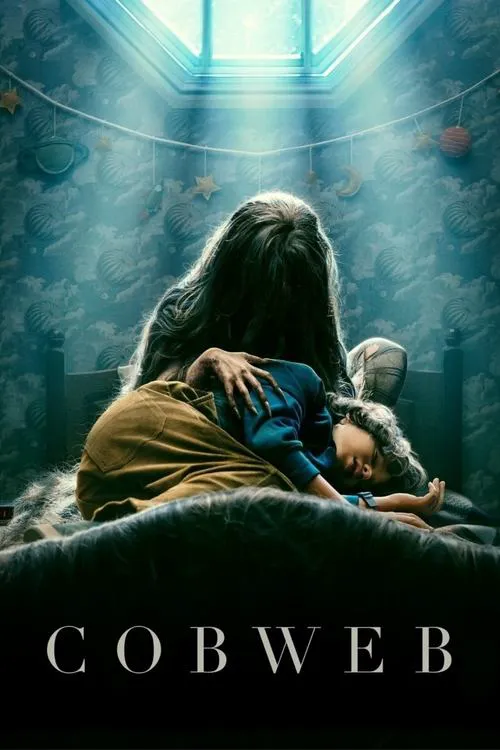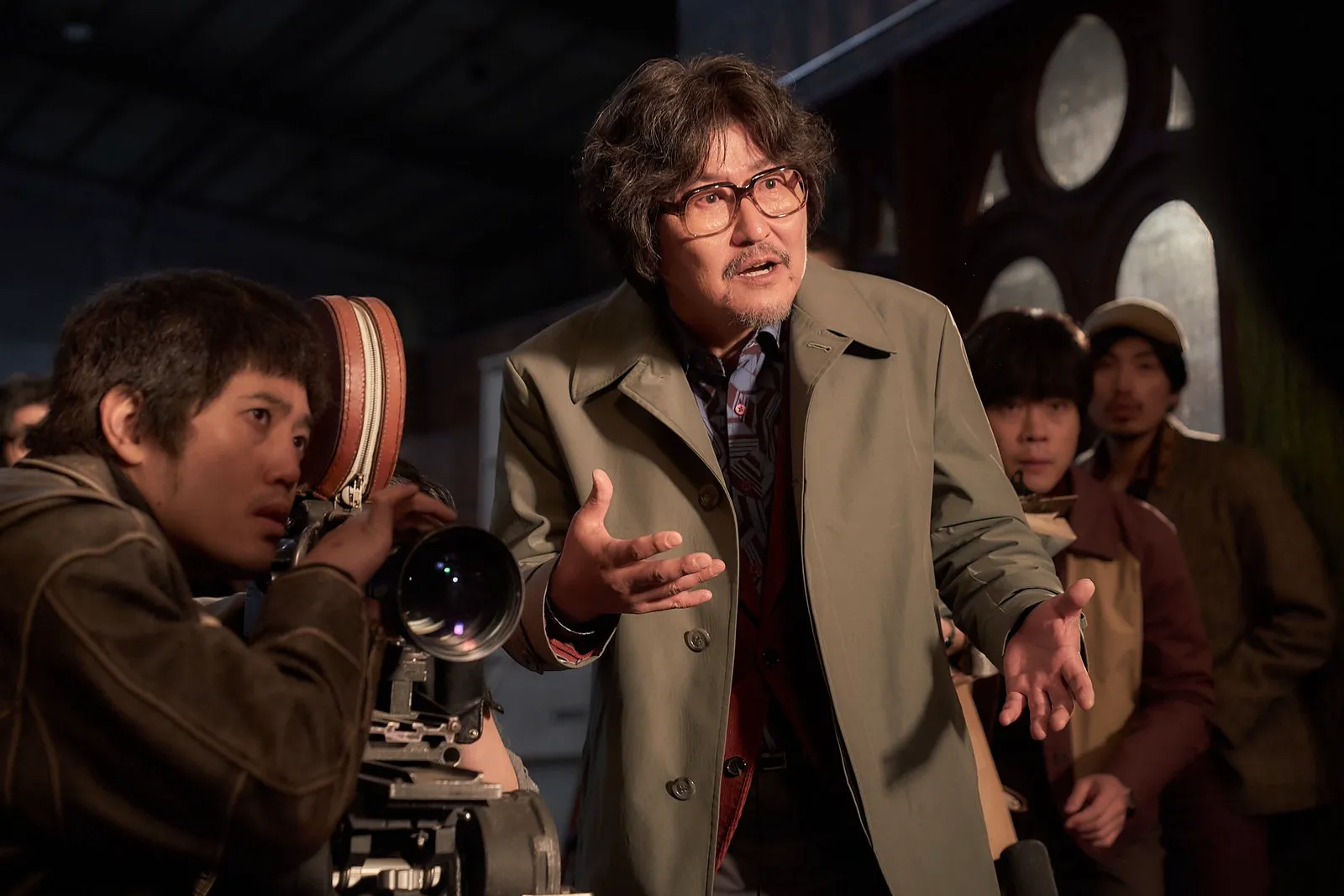Cobweb

Plot
Cobweb is a 2023 horror-thriller film centered around a young boy named Peter, who embarks on a journey to uncover the truth behind an otherworldly presence in his bedroom. At the core of the story, Peter is an eight-year-old boy living with his parents in a seemingly ordinary suburban household. However, Peter's world is turned upside down by a persistent, unyielding tapping sound emanating from within the walls of his bedroom. Despite his repeated attempts to identify the source of the noise, Peter is met with denial and skepticism by his parents, who are convinced that the sound is merely a product of the young boy's vivid imagination. As Peter becomes increasingly obsessed with finding the origin of the tapping, his perception of reality begins to blur. He starts to question whether his parents might be deliberately hiding something from him, whether they're aware of the true cause of the tapping or if they're simply choosing to turn a blind eye to his concerns. Peter's growing distrust of his parents creates an existential rift between him and the people he trusts most. One of Peter's primary concerns revolves around the fact that his parents seem to be lying to him. With every denial and dismissal, Peter becomes more desperate to expose the truth behind the tapping. He begins to scour his bedroom, scouring every inch of the space, searching for any signs that might suggest the tapping is indeed real. In doing so, Peter becomes increasingly detached from his family, and a creeping sense of isolation begins to encroach on him. Catherine, Peter's mother, exhibits a particularly telling behavior throughout the story. Her reactions are always laced with an air of defensiveness and unease. As Peter continues to press her for answers, Catherine's responses become increasingly strained. This, combined with her own apparent detachment from the situation, fuels Peter's growing suspicion that there's more to the story than meets the eye. On the other hand, Peter's father remains stubbornly resolute in his dismissal of the tapping issue. He seems almost reluctant to even acknowledge Peter's concerns, often opting for a dismissive and exasperated tone. As Peter's fear intensifies and his grip on reality falters, Peter's relationships with both parents begin to fray. This escalating tension sets the stage for a confrontation that could either repair their bond or further sever the ties between them. As Peter becomes increasingly consumed by the mystery of the tapping, it begins to manifest in his own behavior. His imagination starts to run wild as he concocts an array of theories, ranging from a malevolent spirit trapped in the walls to his parents employing a sinister cover-up to hide some darker truth. As his anxiety grows, Peter's world begins to splinter, leaving him questioning what is real and what is merely his imagination. The film's exploration of a parent-child relationship is central to the narrative. Peter's growing distrust and disillusionment with his parents forces him to re-evaluate the values and trust he once had in them. This emotional turmoil, coupled with the ominous presence of the tapping, culminates in a series of events that blur the lines between reality and fantasy. As the story hurtles towards its climax, it remains uncertain whether the tapping is an actual entity or merely a product of Peter's imagination. While some aspects of the narrative lend credence to the idea that Peter is dealing with something supernatural, other moments seem to hint that the truth is far more mundane – that the tapping is merely the manifestation of Peter's own anxiety and fears. Ultimately, what's most striking about Cobweb is its thought-provoking examination of the fragility of trust. It's an exploration that asks viewers to confront their own perceptions of reality and question the relationships that make up our daily lives. By presenting a scenario where the audience is left to decide whether the tapping has an actual source or if it's purely a product of a young boy's fevered imagination, the film invites viewers to immerse themselves in Peter's plight as he navigates the blurred lines between truth and fiction. Through its thought-provoking narrative, Cobweb delves into the heart of what makes us question the safety and reliability of those around us. Peter's story raises poignant questions about how easily our perceptions of reality can be manipulated by our fears and our desires, forcing us to reconsider our own relationships and perceptions of the world.
Reviews
Paul
#Cannes2023-35 This was quite different from what I expected. It's not purely about filmmakers fighting against censorship, but more about the director's internal madness. Those who enjoy Kim Jee-woon's style of over-the-top, jump-scare theatrics should find this very appealing. The black and white scenes within the film are shot with a very expressive film noir feel, which I enjoyed.
Damian
Looks like the pandemic has been a real blow to the film industry. Since last year, it feels like filmmakers are only making movies about movies or about themselves. They're just not living anymore.
Quinn
The black and white imagery clearly draws primary inspiration from "The Housemaid." Although Kim Jee-woon's homage to Kim Ki-young's text is heavy-handed, it is also quite distinctive, or as Mido describes it in the film, "Kafkaesque." However, for the vast majority of the film's duration, Kim's overzealousness is misapplied, much like Song Kang-ho's character, Director Kim. The entire film is replete with attempts to argue with the audience/critics, pleading for higher praise. As a consequence, what emerges is a slapstick comedy in the vein of Wong Jing/Östlund, amplified by the uniquely theatrical flair of Korean actors, which becomes particularly pronounced. On another level, by recreating a 1970s film set...
Luca
★★★★½ A director pushed to the brink by censorship, diva actors, on-set accidents, and his own dark past somehow crafts his greatest masterpiece. Kim Jee-woon employs an intricately layered narrative, a play within a film within a film, interlocking perfectly. While maintaining a high level of entertainment, he satirizes censorship and dissects the irremovable wisdom tooth of a creator. Song Kang-ho, Jeon Yeo-been, Krystal Jung, and Im Soo-jung are all outstanding.
Lilah
A behind-the-scenes look, full of Japanese-style chaos (everything but the finished film itself). It seems to be aiming for something like Koki Mitani's "Radio Time." This deviates from certain “films about filmmaking” as this piece focuses on director and actor roles, downplaying the importance of other departments, with very little focus on the administrative side. While essentially adhering to the auteur theory, it thankfully remains interesting without excessive gimmicks. Most of the runtime relates to behind-the-scenes issues, to allow film to be about film, and the final twist serves is made to show how important the director is, though the depiction of production is lengthy and erratic, with room for smoother cuts.
Recommendations





